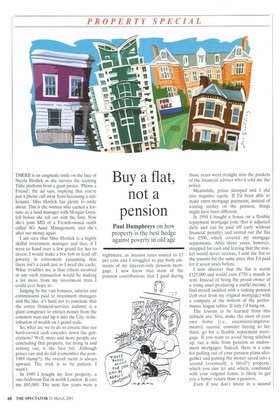Buy a flat, not a pension
Paul Humphreys on how property is the best hedge against poverty in old age
THERE is an enigmatic smile on the face of Nicola Horlick as she surveys the teeming Tube platform from a giant poster. 'Phone a Friend', the ad says, implying that you're just a phone call away from becoming a millionaire. Miss Horlick has plenty to smile about. This is the woman who earned a fortune as a fund manager with Morgan Grenfell before she fell out with the firm. Now she's joint MD of a French-owned outfit called SG Asset Management, and she's after our money again.
I am sure that Miss Horlick is a highly skilful investment manager and that, if I were to hand over a few grand for her to invest. I would make a few bob to fend off poverty in retirement (assuming that there isn't a crash just as I need the cash). What troubles me is that others involved in any such transaction would be making a lot more from my investment than I could ever hope to.
Judging by the vast bonuses, salaries and commissions paid to investment managers and the like, it's hard not to conclude that the entire financial-services industry is a giant conspiracy to extract money from the common man and tip it into the City: redistribution of wealth on a grand scale.
So, what are we to do to ensure that our hard-earned cash cascades down the generations? Well, more and more people are concluding that property, for living in and renting out, is the best bet. Although prices can and do fall (remember the post1989 slump?), the overall trend is always upward. The trick is to be patient. I wasn't.
In 1989 I bought my first property, a one-bedroom flat in north London. It cost me £65,000. The next few years were a
nightmare, as interest rates soared to 15 per cent and I struggled to pay both elements of my interest-only pension mortgage. I now know that most of the pension contributions that I paid during
those years went straight into the pockets of the financial adviser who'd sold me the policy.
Meanwhile, prices slumped and I slid into negative equity. If I'd been able to make extra mortgage payments, instead of wasting money on the pension, things might have been different.
In 1994 I bought a house on a flexible repayment mortgage (one that is adjusted daily and can be paid off early without financial penalty) and rented out the flat for £500, which covered my mortgage repayments. After three years, however, strapped for cash and fearing that the market would never recover, I sold the flat to the tenants for the same price that I'd paid for it seven years before.
I now discover that the flat is worth £125,000 and would earn £750 a month in rent. Instead of being the proud owner of a rising asset producing a useful income, I find myself saddled with a sinking pension (left over from my original mortgage) with a company at the bottom of the performance league tables. If only I'd hung on.
The lessons to be learned from this debacle are: first, make the most of your own home (i.e., extensions/improvements); second, consider buying to let; third, go for a flexible repayment mortgage. If you want to avoid being stitched up. run a mile from pension or endowment mortgages. Indeed, there is a case for pulling out of your pension plans altogether and putting the money saved into a second (eventually a third?) property, which you can let and which, combined with your original home, is likely to get you a better return than a pension.
Even if you don't invest in a second


























































































 Previous page
Previous page